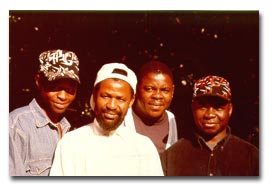 |
The Bhundu Boys were formed in Harare, Zimbabwe, in 1980 by Tembo, Biggie (b. Rodwell Marasha, 30 September 1958, Chinhoye, Mashonaland, d. 30 July 1995, London, England; guitar, vocals, leader), Rise Kagona (guitar), David Mankaba (d. 1991; bass guitar), Shakie Kangwena (b. 16 August 1956, Salisbury, Rhodesia, d. 5 December 1993, Harare, Zimbabwe; keyboards) and Kenny Chitsvatsa (drums).Although the Bhundu Boys achieved prominence both at home in Zimbabwe and overseas in Britain with their own idiosyncratic jit style of dance music, their rise in both territories owed much to the work of bandleader and vocalist Mapfumo, Thomas. He was the first modern Zimbabwean performer to make traditionally rooted music acceptable and stylish in a social climate where previously all things European had been deemed preferable to anything African The band itself was a product of Zimbabwe's late 70s war of liberation, the name Bhundu ('bush') being chosen to commemorate the freedom fighters who fought against the white settlers in rural areas
Jit found almost immediate acceptance amongst the youth of post-independence Zimbabwe and between 1981 and 1984 the band had four number 1 hits - 'Baba Munini Francis', 'Wenhamo Haaneti', 'Hatisitose' and 'Ndimboze'. Three albums, The Bhundu Boys, Hupenyu Hwenasi and Shabini, proved equally popular. In 1986, the band decided to make a sustained onslaught on the British music scene, and moved to the country in readiness for a long stay. They spent most of the following two years on a near-permanent tour, establishing a reputation as one of the most exciting bands in the country. Early in 1987, the band were signed to major label WEA Records, released a second Discafrique album, Tsvimbodzemoto, and supported Madonna at London's Wembley Stadium. A few months later, Biggie Tembo was asked to leave the group, before several members succumbed to AIDS. The Bhundu Boys re-emerged in 1991 with the excellent live set, Absolute Jit, recorded in Zimbabwe, which saw them return to the Discafrique label. Nevertheless, their crushing late 80s run-in with the record industry had shrunk the band's fanbase, and when Tembo was discovered hanged in 1995, it served as a chilling epitaph to a once pioneering group. |
|